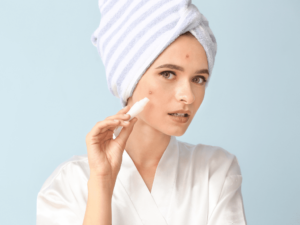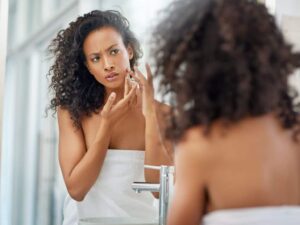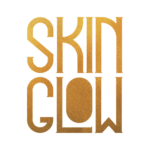Acne is a very common skin condition that might appear during pregnancy. If you have it, you will experience clogged pores that lead to unwanted breakouts, so it is very important not to prick them if you do not want to end up with scars. Because pregnant women can not use all the regular treatments for acne, you need to be very careful when dealing with this condition and to avoid certain medications that can hurt the baby. In the article below, we will present all you need to know about acne in pregnancy, causes, best treatments, and what to avoid when dealing with this condition.
What causes acne in pregnancy?
Many women deal with acne during pregnancy because this condition is caused by increased hormones (androgens).
These hormones make your skin grow and are responsible for producing more sebum. This growth will clog your pores, causing inflammation and bacteria trapped under the skin. Almost half of pregnant women deal with acne so do not be scared if you spot several pimples on your face.
If you usually have breakouts during PMS and periods, there are high chances to develop pregnancy acne when having a baby.
When does acne in pregnancy start?
Acne starts developing, especially during the first and second trimester of pregnancy and it is caused by increased hormone levels. If you have a history with this condition, you are more likely to deal with it at the beginning. However, if this condition does not show up in the first trimester, there are very low chances to get it in your third part of the pregnancy.
Where do you get acne in early pregnancy?
There is no particular place where acne might appear during pregnancy. It just commonly surfaces on the face, back, chin, neck, chest, and even back. However, you might experience this condition in places you never had any pimples before.

Will acne during pregnancy go away?
Acne during pregnancy is caused by an increase of hormones that, after childbirth, will return to their normal levels. Therefore, you will probably deal with this condition only in the first and second trimesters. If you want to be safe and not harm the baby, use natural remedies and avoid all OTC topical treatments and antibiotics. If the condition is too severe, schedule an appointment with a dermatologist or a doctor.
Is acne in pregnancy a sign of a girl or a boy?
Many women think that if having acne in pregnancy will show them in the early stages if the child is a boy or a girl. Studies show that there is no connection between acne and the gender of the baby; therefore the best way to find out is to get an ultrasound scan after 20 weeks of pregnancy. Even so, if the baby has a position that obscures the genitalia, you might not be able to tell the gender accurately.
Acne pregnancy vs. PMS
Acne appears during pregnancy in the first trimester, in the 6th week. Some women will not even know if they are pregnant or not, so it is easy to mistake the PMS with this condition. This happens because the two have numerous common symptoms like mood changes, back pain, headaches, or breast pain. If you notice that your period is late, you might take a pregnancy test or see a doctor. This way you will differentiate the cause of your acne and treat it accordingly.
What NOT to use to treat acne in pregnancy?
Acne in pregnancy is quite tricky because many regular treatments are not allowed when having a baby. Some topical remedies or antibiotics are forbidden because they can affect the child, so the treatment spectrum is quite narrow. Therefore, these are the acne treatments in pregnancy you should not use:
- Isotretinoin is one of the best oral medication treatments for acne but is quite dangerous when you are pregnant because it can cause multiple congenital disabilities.
- Hormone therapy is also not recommended when having a baby.
- Oral tetracyclines include antibiotics and are a big no-no for pregnant women.
- Topical retinoids are similar to isotretinoin. Even if the quantity of product that penetrates the skin is very low, there are several concerns about the risks of congenital disabilities. Also, after birth, women who breastfeed should continue to avoid these cures.

Best practices when dealing with acne during pregnancy
Because acne can be quite tricky during pregnancy, there are a few things you can do to keep it under control. While treating it with antibiotics and certain topical products is not a solution, a better washing routine will help you manage this condition until the overproduction of sebum oil gets back to normal. Until then, here are some practices that will help you with acne in pregnancy:
- Use a gentle cleanser! You need to cleanse your face twice a day with warm water and a gentle product. Avoid over-washing because it might cause irritations.
- Shampoo every day if you spot acne around your hairline.
- Never prick your pimples! Our hands are not always clean, so by popping those pimples, you will only add bacteria to your face and cause an even bigger eruption.
- Avoid products that irritate your skin! Greasy moisturizers and cosmetics should not be part of your routine. Water-based non-comedogenic products are ideal for women who struggle with acne during pregnancy. These products are less likely to cause acne, therefore read the label carefully when buying skincare products.
- Do not touch your face! This includes your hands, phone, and even hair. Keep your strands of hair away, do not place your hands on your face, and use earbuds when talking to the phone.
- Wear loose clothing! Sometimes acne appears on the shoulders and back, and if you are struggling with it, we recommend wearing clothes that are not too tight. Also, it would be best if you avoided headbands of scarfs and everything that might irritate your skin.
- Makeup removal is a must before sleeping, especially if you do not want your acne to flare. Like moisturizers, cleansers, and other creams, makeup can be light and non-comedogenic, and we highly recommend you to use these types of products because the chances of triggering your acne are lower.
- Sun exposure is not recommended! Using tanning beds or exposing your body to sun rays can increase sebum production, therefore the chances of getting acne. Also, you need to know that some medications do tell you to avoid sun rays because they make your skin prone to burns.
Acne treatments in London
There are many types of acne treatments regularly, but as a pregnant woman, they come with contraindications.
Therefore, as a lady who is having a child, we recommend you to use laser or LED light therapy.
Both of these are marked as safe treatments for pregnant women, but we kindly advise you to contact your dermatologist and discuss the problem before making an appointment.
At Skinglow Clinic, we use the best technology to boost collagen, decrease inflammation and kill bacteria that cause acne. With Led therapy, we use red light to penetrate the skin and stimulate collagen, while blue light fights against bacteria that cause acne. Studies show that a four weeks treatment will reduce acne by 69%. If you want to get rid of acne, book your treatment right here!
Skinglow Clinic is based in London, 216 Kensington Park Road. We offer a safe and cosy environment, personalized treatments for your condition, and advanced technology to cure your skin. Whenever you are ready to improve your skin, use the form to contact us, pay us a visit, or give us a call!





